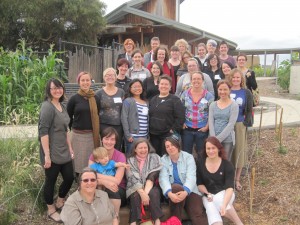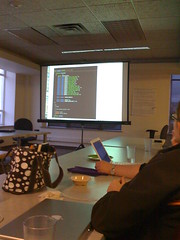I’m finding myself in conversations with friends and colleagues lately about strategy, conflict and overcoming fear. At Ada Camp DC, there were multiple sessions on Imposter Syndrome, and many friends were in career transitions. So, I decided to share parts of private conversations I’ve been having. I think of these conversations as “leveling up.” As the women I know become team leads, managers, directors and executives, we’re all facing similar sets of problems and struggling through as best we can. I hope that people find this stuff useful. I have benefited from a great deal of mentoring and support over the years, and my hope is that this helps someone else in the same way.
Someone asked for some help in handling conflicts, both at work and personally. Specifically, they mentioned that they were plagued by self-doubt. Friends have remarked to me that I “seem so confident” or that they “wish they could be as sure about things” as I am.
When someone says that to me, I get confused for a minute. Because I question myself all the time, wonder if I am doing the right things, and often think that I am really, really screwing things up. I used to never talk about those moments with other people.
I felt pretty alone.
People have told me that I’m “argumentative,” or more politely “a little intense.” I tend to engage in conflict directly, and to resolve problems with people by talking or having arguments. I can be the type of conversationalist that’s a little scary to people who aren’t used to so much directness. But here’s the secret:
I wasn’t born like this.
Confidence is learned and a gift to yourself
Confidence isn’t an innate talent. It’s a skill that you cultivate, and a set of behaviors you can learn. Confidence is what you project to the outside world, and doesn’t necessarily mirror what’s inside. (I’m thinking as I write that — “duh, everyone knows that, don’t write that, Selena!” But really, there are many people who think that to be confident, you have to *feel* confident all the time. And that’s just not true.)
Also, there are many styles of conflict resolution, some that don’t involve arguing at all.
Just because you tend to prefer one style, doesn’t mean you can’t learn others. Confidence is also a gift you give to yourself, because you deserve to not feel like crap after an argument. A lot of the questioning and self-blame people put themselves through is unnecessary. Learning from arguments doesn’t have to involve suffering.
Problem solving: my problem or your problem?
The most important mental model I’ve developed in the last decade is distinguishing between problems that are “my problem” and those that are someone else’s.
For problems that are mine, I take action without having conversation or consensus building and then let people know what I’ve done. I apply this in my marriage, my open source work and in business — and it has made me SO MUCH HAPPIER. In a corporate setting, this is probably the ask forgiveness way of operating.
When something is someone else’s problem, I think carefully about whether I want to help the other person solve it. You are under no obligation to solve other people’s problems.
If I decide to help, I think through possible solutions before talking with the person about it. When I get to the point where I actually talk with someone about a problem, I try to ask the other person what they think before offering my own solution. I find acting out these conversations with a trusted advisor ahead of time is very, very helpful. That’s too simplistic to apply to every type of business problem out there, but it’s a calming thought pattern when I first start problem solving.
When arguments feel hostile
From the research (Gottman’s, specifically), contempt is the primary indicator on whether a marriage survives. If someone is treating you with contempt, or you are using contempt in arguments, that’s a big warning sign.
My experience has been that relationships that are in this state can be repaired, but it takes a lot of work. In business, if someone treats me with contempt, I raise the issue in a business-appropriate way, and if it continues, I get the hell out of there.
Life is too short to be treated like crap. Not everyone has the privilege of being able to switch jobs, but start planning your exit strategy. You deserve a long, contempt-free life.
Recommended Reading
I’m going to share a few of the best books I know concerning relationship conflict.
In my opinion, relationship skills apply equally to personal and professional lives, and the learnings in one context necessarily translate to the other. There are a lot of very bad books out there that will give you counter-productive, and not-science-based advice (and I have read many of them).
I found that good books paired with advice from a counsellor who strictly adhered to proven-with-science strategies measurably helped me. Here’s the books and training I recommend:
- The Passionate Marriage, and Intimacy and Desire: http://amzn.com/e/B001IOFH8M Both books are fantastic for thinking carefully about what marriage really is for you. Defining what intimacy is helped me A LOT in all my relationships. Marriage is a special and weird relationship, and not one that I was prepared for at all.
- Pretty much anything by John and Julie Gottman, like The Relationship Cure: http://amzn.com/0609809539 They’ve also been featured on This American Life, and those podcasts are worth a listen, and slightly more fun that slogging through their “10 steps” type books.
- Harvard University Negotiation training: http://www.pon.harvard.edu/category/courses-and-training/ I arranged for a version of this training to be given just before OSCON for women in open source community management last year, and it was amazing. Every woman who attended said it changed their professional and personal relationships. It’s the type of thing people often can get work to pay for, as it’s obviously work-related training.
- Liespotting: http://amzn.com/0312601875 There’s a bit of pseudoscience in it IMO, but lots of very entertaining stories. There’s a chapter in it about your trusted circle of advisors, and how to test out and develop that circle over time for personal and professional advice. I started working on this for myself last year, and the people who I now turn to are an invaluable part of decision making, and really, my entire life.
- If you’re struggling with illogical behavior and influence patterns (like: “Why the hell did person X do THAT for person Y?”), you may find _Influence_ useful as a primer in how skilled people get others to do things: http://amzn.com/006124189X
Books that didn’t really help me
There’s a series of books I’ve tried to read about “verbal self defense”, but to be honest, none of them helped me. Reading them made me feel better temporarily as I started to recognize different types of “attacks,” but I found their suggestions to be too difficult to remember, for me to be able to implement them in an emotionally charged situation. I’d love to hear from anyone on strategies that work for you, and books that have helped you out.






